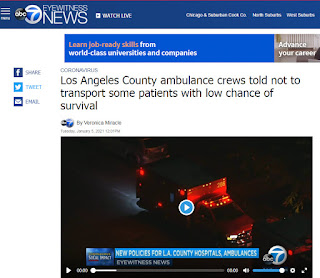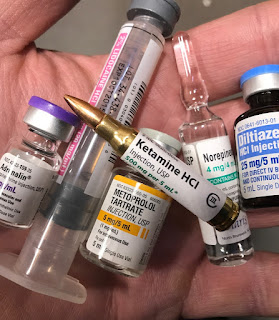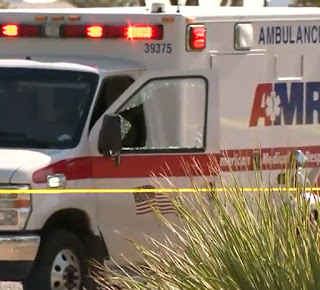Extreme Headlines - Not So Extreme Practices (Cardiac Arrest in the COVID Maelstrom)
There is no shortage of alarming news stories in our current times. Between civil unrest and a surging pandemic, media outlets are almost fist-fighting for the most hits and clicks on their social media platforms. They accomplish this with sensational headlines knowing full-well that our short-attention span, "if it's on the internet it's true" culture will bite on every little tidbit, sharing and clicking until advertising revenue is sky high.
One of the more recent headlines centers around EMS; paraphrased it goes something like this: "Amidst Global Pandemic EMS Providers Ordered to Leave People with Low Chances of Survival.” It sounds scary, doesn't it? The words conjure images of pre-apocalyptic dystopia where the sickest people are left to die in the streets. Yet this is neither "news" nor is it bad practice.
This article is written for my friends and the millions of other people around the world who are not privy to the workings of Emergency Medical Services, and I implore you all to share this far and wide!
Dead is Dead
I'm aware this statement smacks of complete indifference, but the science behind cardiac arrest and subsequent treatment is very simple: once the heart stops a person is clinically dead. Cardiac Arrest means that the heart is no longer pumping blood in pulses through your body. There are many things that can cause this, but the outcome is the same. Blood is not pumping, the victim instantly becomes unconscious, and within about 30 seconds they also stop breathing. The vital organs of the body immediately stop receiving oxygen and acid begins to build up. This is clinical death. The tissues of the brain starve hardest and earliest, with death of brain cells beginning in three to six minutes. We're talking significant, permanent neurological problems even if the victim is successfully resuscitated- amnesia, speech impairment, inability to walk, etc. And, if nothing has been done to help a cardiac arrest victim after nine minutes, the possibility of any sort of survival - even in a vegetative state - is tiny.
If a person suffers a cardiac arrest outside of a hospital (which stats show happens over 300,000 times in the USA each year) CPR needs to be performed as soon as possible - at least within three minutes in order for the victim to have any real chance at survival and return to a somewhat normal life. Yet many of these cardiac arrests are what we refer to as "unwitnessed." This means that the person collapses alone or in an area where their cardiac arrest is not immediately seen by anyone. It is unfortunately very likely that, by the time the person is found to be unresponsive, more than three minutes has passed, and with the average 911 response being six to ten minutes depending on where you reside, EMS crews generally do not get their hands on the patient until ten or more minutes post-arrest. 90% chance of death.
We Have the Tools
EMS providers, specifically paramedics, are highly trained, highly skilled practitioners who specialize in patients who are almost dead or newly dead. The vast majority of our education centers around treating immediate life-threats and stablizing patients until physician specialists can intervene. CPR, defibrillation, airway control, and bleeding control are the main areas of our expertise. Many people still don't appreciate the knowledge and tools that come as part of your ambulance 911 response, but it should be shouted for all to hear: you're not getting a stretcher and a box on wheels. You are essentially getting concierge medicine in ten minutes or less. When you're in the ambulance with me, you are in a portable ER with a very well-qualified guy, and it turns out that the sicker you are, the more likely it is that I have just what you need. Cardiac arrest is pretty sick.
An EMS response to cardiac arrest will include high-quality CPR, effective airway control and artificial respirations, breathing tubes, IVs, and numerous powerful medications. In short, we'll do nearly everything on scene that an ER would do - and your chances of survival DO NOT increase with transportation to a hospital. In fact, studies show that CPR in the back of a moving ambulance is bad. Really bad. Because high-quality CPR is the key to cardiac arrest survival, even a few minutes of crappy or absent CPR can tip the scales for the funeral directors. So for well over a decade now ER physicians and EMS medical directors have all agreed: work 'em where you find 'em. Generally, if we've not been able to regain a pulse on a patient after 30 minutes, that person is dead. In more obvious cases we know after 20 minutes that things aren't going to work out. But they certainly will NOT work out if we scoop up cardiac arrest patients, throw them into the back of the rig, and whisk them away to a hospital. Staying on-scene until return of pulses or termination of efforts is the national standard.
Why the Headlines?
As mentioned, news outlets often tend to be more interested in getting you to click on and share their articles than to actually READ them, so the more sensational the headline, the better. There is wide-spread consternation over COVID right now, so playing on the fears of the people is a good way to get attention. Additionally, EMS providers are awesome, but some of us get very stuck to our past. As an industry we often fail to adjust quickly to changes in treatment modalities, sometimes adhering stubbornly to obsolete ideas. It's something we definitely need to work on. The headline "Ambulance Crews told not to Transport Patients with Low Chance of Survival" is not wrong - but it's not "new," either, and it's only popping up in discussions because with hospital resources being strained, some EMS providers needed to be reminded not to transport dead people.
The Upshot
Leaving dead people alone is a good idea. That's why cemeteries are quiet. EMS has been skillfully handling cardiac arrests on-scene for many, many years, and in most systems terminating efforts in the field is expected, whether or not there is a global pandemic. Again, I urge everyone to share this article, AND to always research sensational headlines. You'll find, perhaps to your dismay, that the stories frequently aren't all that exceptional.



Comments
Post a Comment